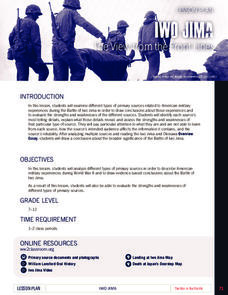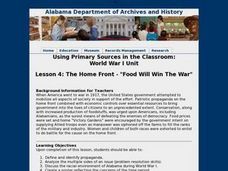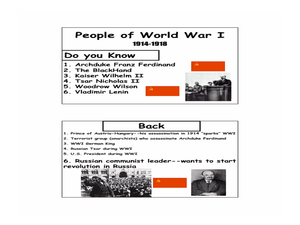National WWII Museum
Evaluating the US Decision to Drop the Atomic Bombs
While the use of the atomic bomb was the definitive end of World War II, the terrible weapons left new questions. Young scholars use primary sources and analytical worksheets to consider the implications of the fateful decision. Then,...
National WWII Museum
Iwo Jima: The View from the Front Lines
Iwo Jima was the site of some of the most grim fighting in World War II. Learners consider this fact while examining primary sources, including letters home, from those on the front lines. After they complete the analysis, scholars then...
National WWII Museum
On Leave in Paris: Maps as Primary Sources
Primary sources—even those that seem mundane—offer a window into those who experienced history. Using a Red Cross map offered to soldiers stationed in Paris after World War II alongside worksheet questions, scholars consider what life...
National WWII Museum
Rationing by the Numbers: Quantitative Data as Evidence
What was it like to live on wartime rations in the United States during World War II? Young historians find out by exploring how those on the home front bought food thanks to the ration system. Other data includes statistics on car sales...
US House of Representatives
From Exclusion to Inclusion, 1941–1992
The legacy of Japanese American internment impacted America for decades, including Congress. Class members consider the tenure of Asian American representatives in Congress and how the legacy of World War II affected their service. Other...
American Institute of Physics
African Americans and the Manhattan Project
A lesson about the Manhattan Project will explode young physicists' understanding of the racial attitudes in the United States during and after World war II. Groups select an African American scientist or technician that worked on the...
Curated OER
The Microwave and the Jiffy Store
Young historians examine the lifestyle changes and cultural changes that occurred as a result of the challenges posed by World War II on society in general. With regard to American History and culture, pupils write an essay on the...
Curated OER
The Legacy of the "Great War"
Young scholars study how the map of Europe changed as a result of the Treaty of Versailles at the end of World War I. They examine the results of the end of the Cold War.
Curated OER
"The New Television Set" a Gateway to the Post World War II Era
Eleventh graders demonstrate their knowledge of the effects of television on the political, economic, religious, social, intellectual and artistic life of the US nation from the 1950's. Research how television shaped public opinion with...
Curated OER
Images at War
Learners examine American attitudes toward war as revealed in Civil War photographs and WWII homefront posters. They analyze and discuss photos, explore the National Archives website, and organize a statement of their findings.
National Endowment for the Humanities
Victory and the New Order in Europe
A New Order in Europe calls for a new lesson plan! This third plan in a series of four sequential lessons encourages high schoolers to read primary sources about the development of the New Order and follow up their knowledge with a...
National Park Service
Remembering Pearl Harbor: The USS Arizona Memorial
Young historians use primary source materials to investigate the 1941 attack on Pearl Harbor and the sinking of the USS Arizona. After reading background articles and studying maps and images of the attack, class members consider whether...
Curated OER
Freedom by the Fireside: The Legacy of FDR's "Four Freedoms" Speech
Middle schoolers read and analyze Franklin Delano Roosevelt's 1941 State of the Union Address. They listen to recordings of speeches by F.D.R., answer discussion questions, and participate in a debate.
Curated OER
The Home Front - "Food Will Win The War"
Students define and identify propaganda. They analyze the multiple sides of an issue (problem resolution skills), then discuss the racial environment of Alabama during World War I. They reate a poster reflecting the concerns of the time...
Curated OER
Who Started World War I?
Young scholars debate which power was responsible for the outbreak of World War I. In this cause and effects lesson plan, students research the causes of the outbreak of World War I on ProQuest in preparation for a (limited) reenactment...
Curated OER
The Causes of Prohibition
Eleventh graders explore the origins of the Prohibition Movement in the United States. In small groups, they analyze the influence of World War I in the passage of the eighteenth amendment. Students explain how different demographics of...
Curated OER
Maus: A KWHL Approach
After reading the introduction to Maus I, class members use A KWHL approach to determine what they know, what they want to know, and where they can find information about World War II, the Holocaust, and other topics associated with Art...
K20 LEARN
Word Warriors: The Code Talkers of Oklahoma
The battle between code makers and code breakers has been going on for centuries and is a key tool of warfare. The contributions of the Native American Code Talkers of World Wars I and II are celebrated in a lesson that features a...
Curated OER
People of World War I
In this people of World War I fact card worksheet, students use the notes and picture provided to create a note card for study purposes.
Curated OER
Where in the World War? Mapping WWII in the Pacific
Students study the geography of the Pacific theater of World War II. They study maps to examine the geography and features of the land.
Rutgers University
How the Allies Won World War II: Island-hopping in the Central Pacific
Using primary source documents, young historians explore the strategies the US used to defeat Japan during WWII. They also learn about the American military experience, and innovations that changed the style of warfare. Students benefit...
Curated OER
Survivor Stories
Trace a survivor's story using a timeline, map skills, poetry and/or prose and photography, and make a visual representation of a survivor's journey through his or her life as a culminating activity for the class and the survivor....
University of California
The Vietnam War (1945 – 1975)
Have you ever wanted to do something so perfectly you wound up not doing it well at all? Young historians use primary and secondary documents to analyze the United States involvement in the Vietnam War. The issues surrounding the...
Curated OER
The Holocaust
Tenth graders reflect on the effects of the Holocaust and the events leading up to World War II. In this World History lesson, 10th graders complete several activities, including a WebQuest, that analyze the Holocaust and its...
Other popular searches
- Causes World War Ii
- World War Ii Map
- World War Ii Holocaust
- World War Ii Battles
- Post World War Ii
- Propaganda World War Ii
- Causes of World War Ii
- World War Ii Newspaper
- World War Ii Veterans
- Allies in World War Ii
- World War Ii Geography
- Post World War Ii Asia























